A Second Generation at La Española Meats Introduces Spanish Products to the US
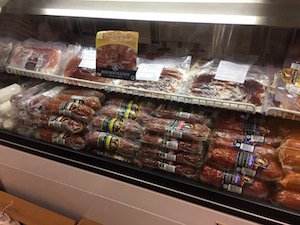 (Gerry Furth-Sides)We happily wandered around the historic La Española Meats shop and deli in Harbor City waiting for the envoy delegation from Spain who were making a stop between seasonal trade shows to introduce their artisanal products to American buyers. Even in the intimate little space that always has lots of customers from near and far, you can find anything you need for Spanish cooking, from smoked paprika to meats, cheeses, paella pans and Spanish wines.
(Gerry Furth-Sides)We happily wandered around the historic La Española Meats shop and deli in Harbor City waiting for the envoy delegation from Spain who were making a stop between seasonal trade shows to introduce their artisanal products to American buyers. Even in the intimate little space that always has lots of customers from near and far, you can find anything you need for Spanish cooking, from smoked paprika to meats, cheeses, paella pans and Spanish wines.
Juana Gimeno Farone founded La Española and the Doña Juana brand of chorizo being produced right in the adjoining building because the rich sausages and hams from Spain were not allowed to be imported in the 70’s. (www.donajuana.com) Somewhere along the way of regular travel to Spain for new products for the American market, the family also began introducing acting as a sort of casual ambassador to Spanish exporters. These days, her daughter, Mari Carmen, carries on the important hosting job. Our group of writers led by journalist Linda Burum, were happy to just sit in the deceptively spacious, languorous, side garden dining area outside. We knew it would transport us to a leisurely afternoon in Spain no matter what the products turned out to be.
 Faraone’s daughter Mari Carmen, our hostess, introduced her husband, amiable Iranian–American (!) Alex Motamedi. Their offerings include Spanish meats, cheeses, wines, olive oils and assorted conservas of vegetables and fish on floor-to-ceiling shelves in the compact little store adjacent to the plant. Artisanal products being introduced into America today include meats, cheese, wines and sweets, and now also include some pork products from pigs raised in Spain.
Faraone’s daughter Mari Carmen, our hostess, introduced her husband, amiable Iranian–American (!) Alex Motamedi. Their offerings include Spanish meats, cheeses, wines, olive oils and assorted conservas of vegetables and fish on floor-to-ceiling shelves in the compact little store adjacent to the plant. Artisanal products being introduced into America today include meats, cheese, wines and sweets, and now also include some pork products from pigs raised in Spain.
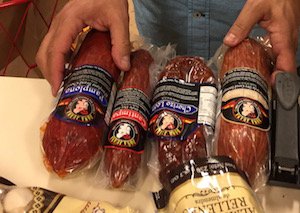
The Spanish Doña Juana meat is very different from Mexican chorizo because it is more like hard salami — and so can be served as you would meat on any charcuterie board without cooking. Each salami is slightly different in terms of spices and texture.

Hostess and store owner, Mari Carmen, also detailed the various chili products used in the meats and how they used in home kitchens
As the envoys arrived, so did platters of Spanish chorizos, thin-sliced serrano ham on rolls, bread rounds topped with morcilla and chistorra sausages, fat olives speared on picks with white anchovies and peppers, goat cheese with rosemary and Manchego style cheese. And, finally, black squid ink rice with clams and squid. In Spain the small, perfect salty bites are served with complementary wines and beers.
Paella arrived from the back room in a copper pan, burnished from use. Chorizo, chunks of pork, chicken, mussels, shrimp, piquillo peppers and squid dot the perfectly cooked black rice. Paella is offered every Saturday to guests in the outside area, a holdover of the companies early days when Farone did her best to acquaint food lovers not only with the chorizo but how to prepare and serve it.
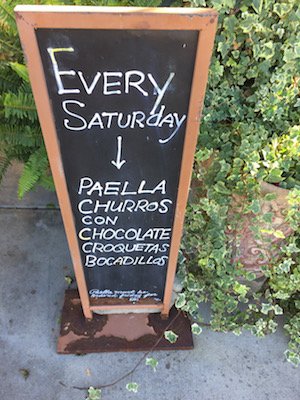
The Trade Commission of Andalusia envoys arrived with specialty products they were looking to market in the United States. They included packaged stuffed olives and olive oils. Tastes of the flavored tonic waters and papery “crystal” cracker-breads and sticks, the “current rage in all of Europe” completed the list. Each exporter would explain his produce to Mari Carmen and then to us. Enthusiastic David Castro, former sommelier and professional cheese critic for Michelin, captivated us with his story about how he dreamed up the creation of his product, “crystal breads,” to go with the finest cheeses.


(//www.donajuana.com) ,La Española Meats, 25020 Doble Ave., Harbor City, (310) 539-0455. Hours: Mon-Fri, 8:30 am-5:30 pm; Saturday from 9AM to 5 PM. A short sandwich menu is available daily, with ingredientss you can add from store product purchases, such as special cheeses. The House paella served Saturdays with a reservation is $9 plus tax.


 Gerry Furth-Sides
Gerry Furth-Sides 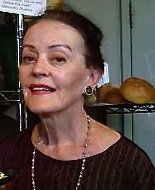 Barbara Hansen
Barbara Hansen 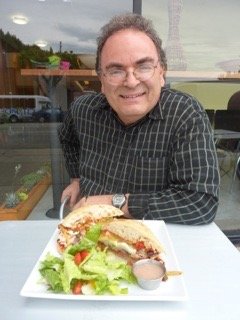 Chef-owner Alain Cohen
Chef-owner Alain Cohen  Roberta Deen
Roberta Deen  Jose Martinez
Jose Martinez  Nivedita Basu
Nivedita Basu